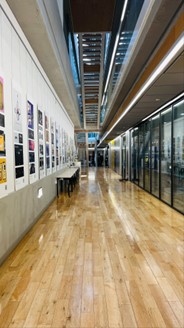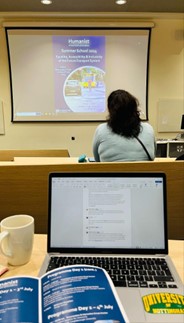post by Iris Jestin (2023 cohort)
Over the summer of 2024, I had the opportunity to attend the HUMANIST Summer School which researches human factors challenges in transport, held at Loughborough University. The theme of the summer school was Equality, Accessibility, and Inclusivity of the Future Transport System, which couldn’t have been more relevant to my PhD in Adaptive Driving Interfaces for the Ageing Population in Future Vehicles! There were researchers that had come in from different universities from various parts of the world. It was exciting to see the research that was happening in the area across the world.
 |  |
The three-day summer school started on day one with PhD student presentations called the two-minute thesis. Presenting my research for two minutes seemed more challenging than being asked to present for longer. Listening to the others presenting their research, I couldn’t decide which was possibly the most interesting and relevant to mine, with me making a mental note to talk to almost every researcher about their research, when they were done presenting.
The following days had talks given by various academics out of which some were more relevant than others. One of them that stood out to me was a talk on Driving with Dementia and Mild Cognitive Impairment given by Professor Eef Hogervorst and her PhD student Ahmet Begde from Loughborough University. Eef spoke about normal ageing versus pathological ageing and how this has varied effects on driving. Ahmet spoke about the combinations of tests that explore sensorimotor performance in driving that might best predict dementia. Another session that felt extremely relevant was given by Sharon Cook, a senior lecturer from Loughborough University, who spoke about Using Empathy Suits to Understand Driving Constraints for Older Drivers. Sharon had through her extensive research created a suit which simulated physical constraints of older adults to make research on older drivers more tangible. This felt particularly useful as it gave me insights into how using these empathy suits might be a feasible alternative to involving older adults in driving research. But the point to note was the suits simulated physical and not cognitive constraints. Ana Anund, a researcher from the Swedish National Road and Transport Research Institute (VTI), spoke about deploying Autonomous Pods and Shuttles in the city of Linkoping, Sweden, where it is in the testing phase with the residents of the city. The pods were implemented to run in one direction across the city in the shape of an ‘8’. She mentioned that based on insights from the testing, the pods needed to be adapted to be more inclusive. An example that was mentioned was how a blind resident found the autonomous pod to be very quiet for their liking.
As much as I enjoyed all the sessions, the highlight of the summer school however was visiting the Leicester Space Centre on one of the evenings, followed by a dinner under a hanging planet and star display. This was a good experience to take in the displays from different space missions over the years as well as a good time to network with the other PhD students and academics from different universities. I even found some fellow researchers from the Swedish VTI that were open to circulating my scoping study questionnaire and information sheet around with peers, to help me get responses.
Overall, it was a lovely experience with learnings about how transport research is done across different universities and countries, and innovative methods used for it, prompting some interesting conversations with relevant academics to bear in mind for potential collaborations.
I close with an array of pictures from my favourite bits of the summer school!
 |  |  |
 |  |  |
